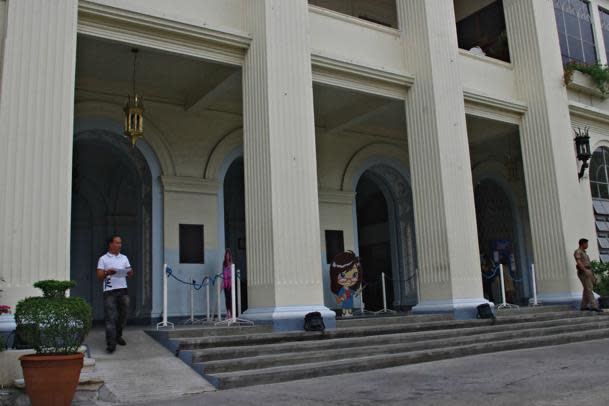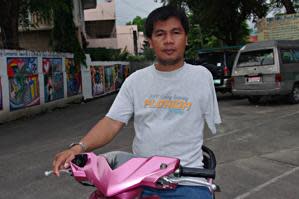Ilocos Norte only Region 1 province without PDAO
By Leilanie Adriano, VERA Files
LAOAG CITY—Ilocos Norte is the only province in Region I that has failed to comply with the law creating a provincial Persons with Disability Affairs Office (PDAO), while only one out of its two cities and 21 towns has set up the office.
Priscilla Dada, the province's Social Welfare and Development Officer and focal person for PWDs, said the local government has been dragging its feet in creating the PDAO, which is mandated by Republic Act 10070.
Even without a PDAO, the province has been funding and implementing PWD-initiated projects and programs, but a PDAO would make it easier for the local government to address their concerns, Dada said.
The law, passed in April 2010, ensures that programs for PWDs are implemented through the setting up of a PDAO in each province, city and town. It allows only fourth- to sixth-class towns to appoint a focal person or PWD Affairs Officer in lieu of PDAO in the meantime if they have budget constraints. Ilocos Norte has nine fourth-to sixth-class towns.
A proposal to establish a PDAO in Ilocos Norte was submitted to a provincial board member who is in charge of the committee on social welfare more than a year ago, but has not been acted upon.
Only the town of Bangui has complied with the creation of PDAO, said Dada, who has been PWD focal person for four years now.
Ilocos Norte is the northernmost province of Region I, composed of the northern Luzon provinces of Ilocos Sur, La Union, Pangasinan and Ilocos Norte. It had a total population of 547, 284 as of August 2007.
The Commission on Elections lists 1,670 registered PWD voters as of January 2012 while data from the National Household Targeting System for Poverty Reduction of the Department of Social Welfare and Development (DSWD) show it has 2,182 PWDs as of February 2011.
"I feel so helpless in a way that I can feel the feelings of PWDs," Dada said. "If possible, all of them should be served. How I wish their condition of life gets improved, not afraid or ashamed for who they are."
Under the law, the local chief executive appoints a PWD affairs officer, priority for which is given to a qualified PWD to "manage and oversee the operations of the office."
On Sept. 23, 2010, Interior Secretary Jesse Robredo issued Memorandum Circular 2010-103 directing all provincial governors, city and municipal mayors, DILG regional directors and others concerned to implement RA 10070 establishing PDAOs.
Jojo Llanes, 36, president of the Alyansa ng may Kapansanang Pinoy (AKAP-Pinoy) based in Ilocos Norte, said the existence of PDAO should have eliminated problems encountered by PWDs when availing of government services as mandated by law because the PDAO will act as their bridge to concerned authorities.
Llanes, who is also the vice president of the Federated Association of PWDs in the province, cited the limitations of the DSWD in assisting PWDs.
"Not all PWDs are aware of their rights and privileges. When they don't go and ask for help to the local government units concerned, nothing happens. It also takes time to grant their request or (it is) left unattended without constant follow up which is very frustrating for PWDs especially those with problems on mobility," he said.
Llanes, who has an amputated arm, said an ordinance creating said office of PWD (then called as Office of Persons with Disability Affairs) has been approved since 2009 but the city government has not implemented it for lack of funds.
Samuel Corpuz, a PWD with inborn hearing and speech disability, told VERA Files in a written interview that it could have been "good" and "easy" for them to avail of services to the local government should the government treat PWDs like him with equal rights and respect.
On the other hand, provincial government employee Marino Guieb, another amputee who walks with an artificial leg, said, "Maybe, local government units don't see it (establishment of PDAO) as important or it could be due to lack of funds."
"It should have been better if we have a separate office for PWDs who will look at the needs and provide necessary intervention or assistance," he said.
Guieb said the establishment of PDAO will make the work easier for PWDs to facilitate their requests and as a result, PWDs will become more organized and well-informed of their basic rights and privileges.
In most cases, social workers like Dada said PWDs are "taken for granted" by LGUs and are not given due recognition as part of a community.
Of the 2,894 PWDs aged 0-59 years old as of January 2011 in Ilocos Norte, the PSDWO said there may be a number of still undocumented PWDs located in remote areas, who still remain "in the closet" because their family members are ashamed of them or just want them away from public eyes.
Despite not having a PDAO, Dada said the provincial government allocates an annual budget of P100,000 for PWD-initiated programs and conducts social enhancement program for PWDs in time for the National Disability Rehabilitation and Prevention (NDPR) Week every third week of July.
In cooperation with nongovernment organizations, it also provides medical assistance, assistive devices, artificial legs and augmentation funds for the purchase of hearing aids, she said.
The provincial board has also passed one ordinance and three PWD-related resolutions. In 2010, a resolution was passed reminding business establishments of their legal obligation to grant 20 percent discounts to PWDs.
In 2006, an ordinance was passed providing free admission to PWDs in the provincial museum and other recreational facilities, including free and unlimited access to public exhibitions and entertainment events organized by the provincial government.
In 2004, two resolutions were passed, one giving special privilege to PWDs and senior citizens to be served first in queues, and another urging all offices to coordinate all efforts in the registration of PWDs.
(VERA Files is a partner of the "Fully Abled Nation" campaign that seeks to increase participation of PWDs in the 2013 elections and other democratic process. Fully Abled Nation is supported by The Asia Foundation and the Australian Agency for International Development. VERA Files is put out by senior journalists taking a deeper look at current issues. VERA is Latin for "true.")



